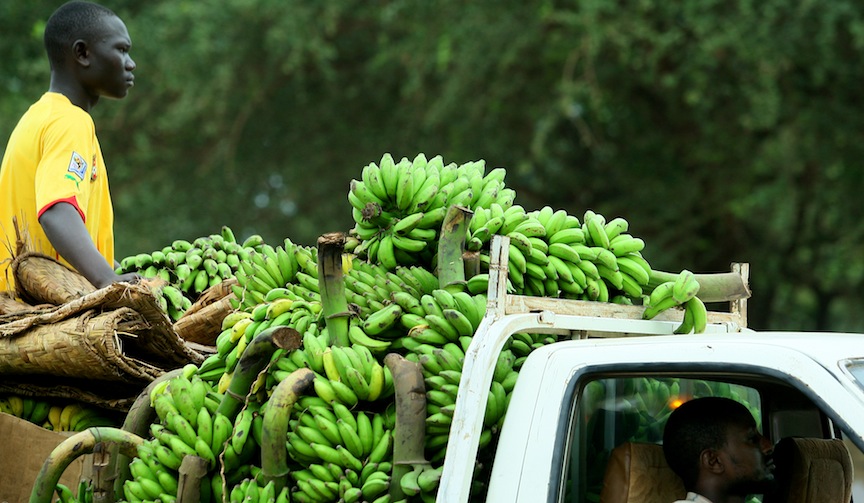
A young African Sudanese man seen riding a truck carrying bananas in Juba, the capital of the Republic of South Sudan. South Sudan became an independent state on July 09, 2011, and soon thereafter also a United Nations member state. South Sudan is one of the poorest countries in the world.
August 20, 2011. Photo by Moshe Shai/FLASH90
**MAARIV OUT**
Food security is now threatened by something far more onerous than Mother Nature: a debate about whether to tinker with Mother Nature, because many scientists believe there is a reasonable defense: GMO. But will Africans starve before embracing GM foods?
First discovered in Asia in the 1950s, the Fusarium fungus wipes out banana crops. The first to go was the old Gros Michel variety which was about the only banana the world consumed before World War II.
There are now five widely produced varieties of banana and this diversity in part was a good defense against the wipeout of the Gros Michel. The single variety that dominates the global market is the Cavendish.
The Cavendish came under attack by Fusarium around 2013. The wipeout began in Mozambique and prompted agricultural institutes in South Africa to sound the alarm continent-wide.
Last November Australian scientists announced they had successfully created a GM line of Cavendish that is resistant to Fusarium in part by splicing in genes from the pepper plant.
Bananas are the largest single food staple throughout East Africa and much of sub-Saharan Africa, sort of like rice is for Asia. Almost a third of the entire caloric intake of an Ugandan is banana.
In Uganda, though, 85% of the bananas consumed are not Cavendish but an “ever”green variety, matoke, that is cooked like a potato. Even this much different variety, though, is now under attack from increasing viruses. It seems reasonable that the Australian model could be used to create a matoke GMO. End of story?
Hardly. African resistance to GMO agriculture is stiff.
The resistance is understandable. Malicious attempts by multi nationals like Monsanto to dump inferior GM grain seeds on Africa created widespread skepticism of GMO in the last decade.
(See these two important earlier references in my blogs: Dec2013 & Dec2017.)
Essentially the flawed early varieties of GM corn that were dumped on Africa after being banned in parts of the U.S. and Europe required such after growth management — particularly with regards to an overuse of pesticides — that significant disruption was caused to many African grain markets.
The resistance to GMOs is not, of course, confined to Africa. Note, for example, that Chipotle stopped using all GM foods in 2015. It was widely expected that other competing chains would follow suit but they didn’t.
GMO use in America has increased substantially since 2015 with a growing body of scientists willing to battle anti-techies.
In a remarkably bold move in a country ruled by an iron-fisted crazy man, Ugandan farmer scientists have begun developing their own GMO bananas in wanton violation of local law.
“Breakfast, lunch and dinner, 365 days a year,” an Ugandan farmer told The Guardian was how often bananas dominate a meal. “If we just leave this, bananas will slowly disappear from Uganda,” he said.
Globally at a much higher profile scientists are speaking out against numerous anti-GMO platforms like Greenpeace. Led by Nobel Laureate Richard Roberts of the UK, 112 other Nobel Laureates distributed a declaration several weeks ago specifically lobbying Ugandan authorities to embrace the new bananas.
The problem is that the actual facts of the issue and the heartfelt actions of respected scientists don’t address the damage that companies like Monsanto and Dow brought upon Africa in the past.
Until that’s admitted and readdressed GMOs in Africa will be a hard sell.
Thanks Jim. This did help to clarify the issues. Never simple.